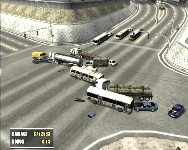More fallout from Peter Baxter’s decision to remove Super Columbine Massacre from the Slamdance festival:
First Jonathan Blow pulled Braid, and now Jenova Chen has pulled flOw.
Not much to say, the error of Baxter’s decision so obvious, and Blow and Chen deserving credit for sticking out their neck.
The basic problem is this: For unknown reasons, some people assume that games always condone the actions of the player or the events in the game. This is obviously wrong, so let me offer a broader perspective with what I wrote in Half-Real about what games mean:
*
Where is the moral?
As a first example, consider Cecil B. DeMille’s film The Ten Commandments (1956). With Charlton Heston playing the part as Moses, we follow the biblical tale about the birth of Moses, his adoption, the exodus from Egypt, Moses parting the waters, and finally receiving the Ten Commandments from God. In this film, it is clear that the protagonist is good, and that his actions are good. This means that we see the protagonist as carrier of the film’s moral, but are protagonists always good? We can compare the Ten Commandments to Mozart’s opera Don Giovanni: The personal goal of Don Giovanni is to seduce as many women as possible, something at which he is sublimely skilled. Towards the end of the opera, Don Giovanni is offered the option of repenting his sins, but he refuses and is finally swallowed by the flames of hell. It should be clear that the moral of the opera is that God punishes sinners, and that the protagonist demonstrates what we should not do. We do not automatically assume that the actions of a protagonist are “good” or “right”.
[…]
A meaningful car crash
We can see why it would be a misunderstanding to see a game as an expression of the players wanting to perform the in-game actions in reality. Games are rather – like stories – things that we use to relate to death and disaster. Not because we want them to happen, but because we know they exist. Consider the game Burnout 2 (Criterion Studios 2002). Burnout 2 can be played in a special crash mode, where the object is to drive into a busy intersection at full speed in order to create as large pile-ups as possible (fig. 5.18). It should be obvious that we do not play this game because we want traffic accidents, but because we know they exist and because we want to consider the possibility of death and destruction.


Figure 5.18. Burnout 2 (Criterion Studios 2002), crash mode: Create the largest traffic accident possible.
The audience of a movie does not automatically assume that the protagonist does good, and neither does the player of a video game believe that the protagonist of the game does good. A game is rather play with identities, where the player at one moment performs an action considered morally defensible, and the next moment tries something that the player considers indefensible. The player chooses one mission or another, tries to complete the mission in one way or another, tries to do “good” or “evil”. Games are playgrounds where players can experiment with doing things they would or would not normally do.
[…]
I think that having the tools for discussing games, and remembering how we interpret other cultural forms can prevent us from making na?ve, literal interpretations of games.

Murray Smith’s term “perverse allegience” comes to mind – like when we actually WANT Norman Bates to succeed when the car is driven out in the swamp – it does not immediately sink, and we are on the edge of our seats for a few seconds – then finally it decides to sink and we’re relieved – even if the act is as immoral as can be, of course.